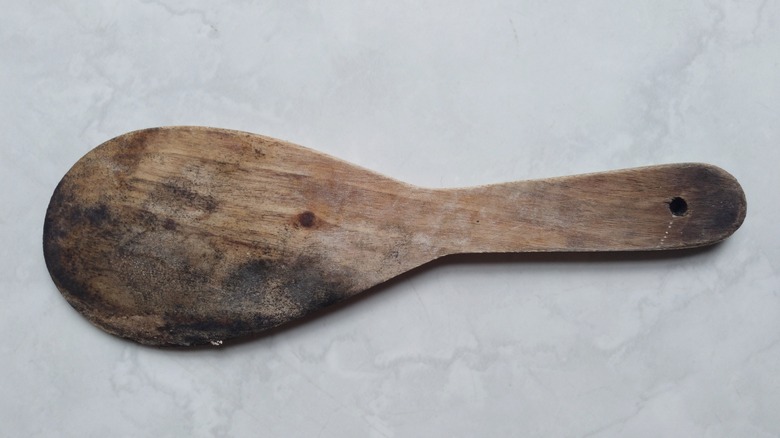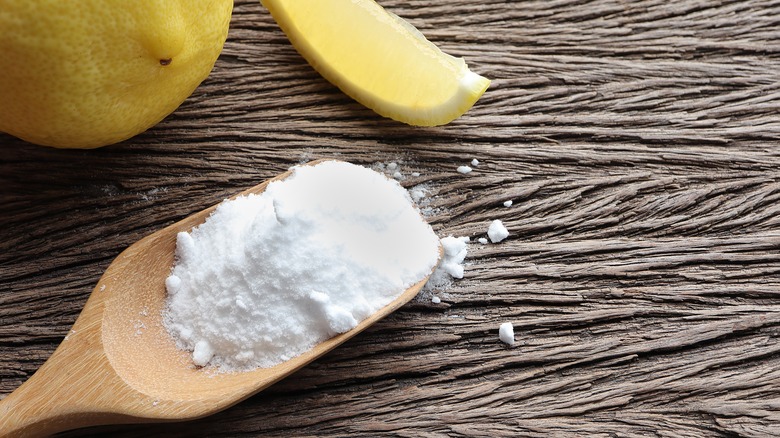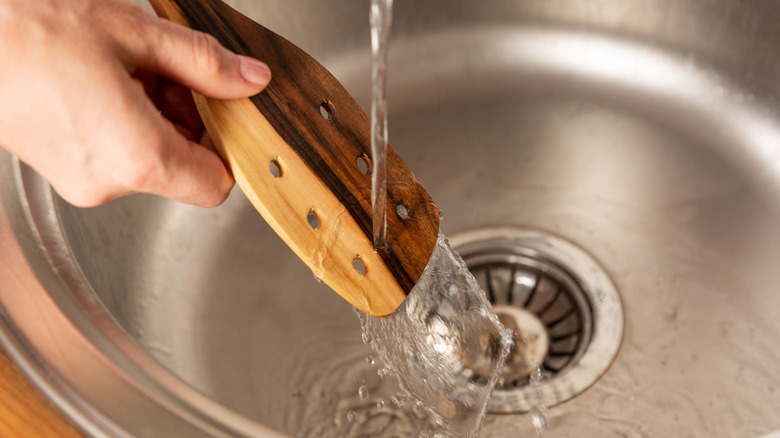Use A Little Baking Soda To Deep-Clean Wooden Utensils Like A Champ
Wooden spoons have been a kitchen staple for generations due to their natural makeup and versatility when cooking. They're much less likely to scratch pans than their metal counterparts while still being hardy, and they do not transfer heat up the handle. However, they require a little bit of extra care when it comes to ensuring their longevity and safety.
Scrubbing down kitchen supplies made of glass, ceramic, and steel is a straightforward part of everyday kitchen habits, but caring for wood comes with its own set of challenges. Since wood is an absorbent material, it can take on the flavors of dish soap and retain water, which can lead to bacterial growth. Washing it like other items in your kitchen can result in swelling and cracking over time. There are a few tips that can help you ensure a long life for your wooden utensils, and baking soda in particular can be your best friend for deep cleaning and deodorizing your favorite wooden cookware.
Deep-cleaning wooden utensils with baking soda
Your wooden utensils face a tough work environment. Heat, moisture, acids, odors, and foods that stain are part of the job. Take a look at your wooden utensils, then give them a sniff. If your wooden spoons have taken on the smell of the foods they've been exposed to, it's time to reach for the baking soda. Sodium bicarbonate, commonly known as baking soda, naturally neutralizes odors. The absorbent nature of baking soda removes strong smells, drawing them out of the wood and making them scientifically neutral.
Baking soda is actually classified as a salt. Therefore, when sprinkled on a surface, it has a lightly abrasive texture that makes it efficient for cleaning. To clean wooden utensils, dust the surfaces with baking soda, wipe them down with a damp sponge, and then rinse. Alternately, use a cut lemon to apply the baking soda to the wooden surfaces. Citrus is another natural deodorizer that will leave your wooden spoons clean and odor-free. Another option is to make a paste using three parts water to one part baking soda. Then, spread the mixture across the wooden utensils, let it work for several minutes, scrub it off, and rinse.
General care and cleaning of wooden utensils
With regular use, you'll want to give your wooden utensils this type of deep clean about once a month. If you don't have any baking soda, you can also sanitize your wooden utensils by spraying them down with a layer of hydrogen peroxide. Whether you use baking soda, lemon, or hydrogen peroxide, allow the cleaning agent several minutes to work its magic before rinsing. In between deep cleans, preserve the protective finish and structural qualities of wooden utensils by rinsing them with water and mild dish soap immediately after use. Never put your wooden utensils in the dishwasher or soak them in water, as a heated liquid bath can end up warping and cracking the wood, paving the way for even further bacterial growth.
Keep your wooden spoons moisturized and ready for duty with an application of oil every month or so. Apply food-grade mineral oil or beeswax to your thoroughly-dried wooden utensils. Completely coat the utensils and place them on a rack or insert them upright into a jar or utensil crock so they receive good airflow while they dry. Your utensils will be ready for use when they're dry to the touch. If they're still sticky, give them more dry time. If it's been 12 hours or more and they still feel oily, wipe them down with a napkin or paper towel.
Note that sometimes, the damage on wooden utensils is beyond repair. At some point, it's best to cut your losses. Know when to toss your well-used wooden utensils to avoid the development of bacteria in your cooking implements.


